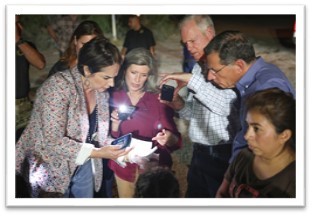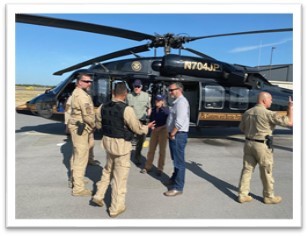Joni Ernst: I witnessed the crisis at our Southern border firsthand. Here’s what I saw.
Late on the evening of July 14, we landed in McAllen, Texas. It was well past nightfall. Soon after touching down, we climbed into a row of vehicles and headed a few miles further south to the far edge of our nation’s border with Mexico and into the heart of what’s known as the Rio Grande Valley sector.
In the backdrop of a record-breaking number of crossings at our Southern border and reports of Customs and Border Protection (CBP) being understaffed and overworked, a group of Republican senators and I were partaking in a delegation trip to witness the situation for ourselves. What we saw was horrific.
That very evening, we joined a night operations tour led by the Texas Department of Public Safety and the National Border Patrol Council. In no time, we encountered groups of migrants traveling into the U.S. illegally, including unaccompanied children. Two of the little girls we encountered had no parents and no guardians; they were completely alone. Each had paperwork on them that included contact information for relatives who were already here in the U.S., a common tactic deployed by the cartels who dangerously smuggle these migrants illegally.
The Border Patrol told us that about 30 percent of the women and girls that are being trafficked by the cartels are being sexually abused along the way. And those are just the ones that are being reported. In reality, some CBP officials feel that a more accurate number would be around 60 percent. As a mom, I'm appalled by these stories of young girls who suffer abuse while being trafficked by cartels, and the havoc and heartache created across our communities – in Iowa and throughout the country – because of the number of lethal drugs flowing across the U.S.-Mexico border.
During our tours and meetings, I had a chance to speak with a pilot who is a part of CBP’s Air and Marine Operations who described a heartbreaking account. He told us there was a two-day period where they were searching for the body of a toddler that had been left behind by the toddler’s mother. The mother had told the agents when she was doing her intake that she had to leave her toddler behind. She gave them an approximate location of where the toddler would be located. After searching for two days, they were unable to find the child’s body.
We also met with residents and landowners who live and work only miles from the border. One man, a former Marine who served in Afghanistan, described the situation by comparing it to his time in the military overseas, telling us he felt like he was in Afghanistan all over again. He said to us, “I have seen more dead bodies here” than he did while deployed. He even compared the cartels to the Taliban, explaining that, to him, they are basically the same type of organization. “They control all of the land there. They control who goes in, who goes out,” he told us.
These cartels are only getting smarter and more advanced. Their so-called ‘spotters’—individuals hired by the cartels to surveil stretches of the Southern border and report on Border Patrol movements—have become a critical player in how the cartels evade law enforcement. I just introduced new legislation to crack down on this aspect of the cartels’ operation by increasing the penalties for those who aid cartels in illegal activity. By implementing stricter penalties on spotters, we’ll not only deter new individuals from joining cartel efforts, but we’ll help prevent more experienced spotters who have been apprehended from quickly returning to action.
We are facing a humanitarian and national security crisis of historic proportions at our Southern border. Anyone who visits our Southern border, hears directly from our border officials, and sees this historic crisis firsthand could not possibly claim that our border is closed—despite what Biden administration officials falsely say.
Let’s make no mistake about it—because of the policies of President Biden and his administration, the crisis at our Southern border is raging and is compromising the safety of our communities and our homeland, turning every state into a border state. I was there last week. I heard the gut-wrenching stories, met the men and women of our Border Patrol serving under extraordinary circumstances, and saw the crisis for myself. President Biden, on the other hand, hasn’t bothered to be there.
The president needs to see this crisis firsthand. More importantly, he needs to secure our border and address this deadly, dangerous, and heartbreaking situation.
Joni Ernst, a native of Red Oak and a combat veteran, represents Iowa in the United States Senate.


Click here or on the images above for more photos from the trip.

Click here or on the image above for an official portrait of Senator Ernst.
